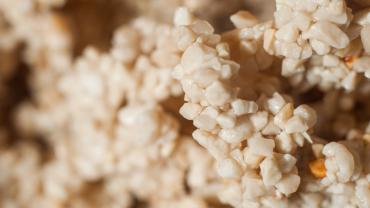
Zeolite is a type of mineral from clay that has been shown to help promote certain aspects of the detoxification process in the human body. Its porous molecular structure helps support certain biochemical actions that occur throughout hepato-enteric detoxification including ion exchange and adsorption.
Adsorption is a process that involves surface attachment to the binding molecule. Adsorption, however, contrasts with absorption, which is when a particle is integrated into the molecule or solution. Essentially, molecules that exhibit adsorptive qualities may have an increased potential to bind and eliminate more toxins when compared to those that only absorb. Binding through adsorption may help support toxin elimination and normal detoxification. On a molecular level, increased porosity and surface area may help maximize a binding molecule’s adsorptive potential.
Clinoptilolite is a type of zeolite mineral that is highly porous and has been shown to exhibit adsorbent properties. It is chemically inert and its molecular size prevents its passage into the bloodstream. It has been shown in research to help bind and neutralize certain heavy metals, mycotoxins, and other harmful substances. Evidence suggests clinoptilolite may also help support intestinal barrier integrity. It may also help promote healthy liver function, antioxidative status, and immune and cellular health.
Binders such as clinoptilolite may help promote the body’s response to certain toxins and heavy metals. Clinoptilolite is thought to act through direct adsorption of heavy metals, such as lead, helping to prevent transepithelial uptake and transference to blood compartments. Laboratory studies indicate that clinoptilolite tuffs may help adsorb other heavy metals including thallium, barium, nickel, and cadmium. Clinoptilolite has also been shown in studies to help bind and neutralize mycotoxins and other clinically relevant substances.
Clinical studies have investigated the potential supportive role of clinoptilolite in support of detoxification pathways. A randomized, placebo-controlled, double-blind parallel-group trial explored the potential impact of G-PUR®, a patented form of clinoptilolite tuff, on enteral lead uptake in healthy adults. The study involved 42 individuals who were randomized to either placebo or intervention group consisting of oral G-PUR® in either 2 g or 4 g amounts, alongside a stable lead isotope 204Pb as a tracer. Individuals receiving G-PUR® were reported to experience a reduced enteral lead uptake of 90% demonstrated by blood and urine biomarkers. Total blood lead was reported to be significantly higher in the placebo group as compared with both treatment groups. Twenty-four-hour urine excretion was also shown to be substantially smaller in the treatment groups as compared to placebo.
Clinoptilolite may also help support intestinal mucosal cell integrity and certain aspects of gastrointestinal (GI) health. G-PUR® was shown to help promote brush border health and help support the body’s response to toxin-induced epithelial changes in the presence of Clostridioides difficile (C. difficile) in a laboratory study. A placebo-controlled randomized clinical trial involved 2 g of G-PUR® three times daily for 12 weeks in individuals with diarrhea-predominant irritable bowel syndrome (IBS-D), a condition characterized by gut permeability. At study terminus, improvements in symptoms associated with IBS-D were observed. Improvements in gut microbial diversity as compared to placebo were also reported.
While more research is needed, particularly in the clinical setting, clinoptilolite from zeolite clay may help support certain aspects of the detoxification and elimination processes. It may also help support GI function, intestinal wall integrity, and optimal cellular health.
By Dr. C Ambrose, ND, MAT